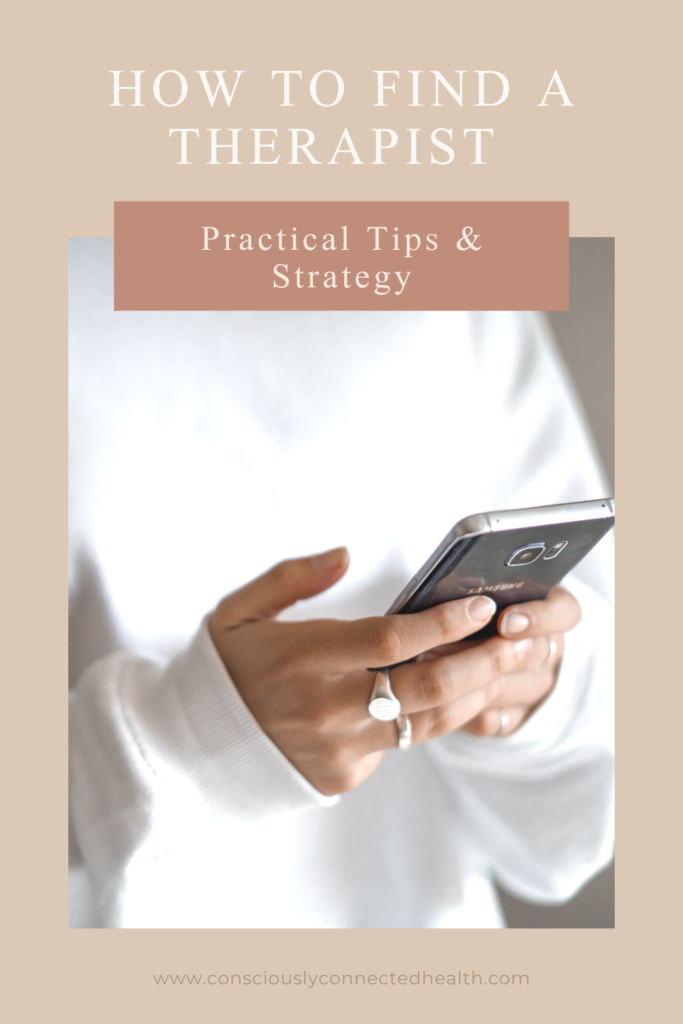So you’ve decided to search for a therapist. Now what? Whether you’re looking for the very first time, or wanting to try a new therapist, the reality is that it can be a slow process. And knowing where to look or how to even start can be an overwhelming process. Here are some tips and suggestions on how to find a therapist, that I hope will ease your experience!
Realistic Expectations & Practicing Patience
First, realize that it might take a while to get an appointment with a therapist. Accept and get comfortable with that fact, and cultivate patience throughout the process of looking and contacting people. Some therapists might be fully booked and not currently accepting new clients, some might have a waiting period, and some honestly might just never call you back. So be prepared with patience and persistence! Stick with it and don’t lose hope. Trust the process to bring you to the right opportunity.
Get clear on what you want and need
Secondly, before reaching out to any therapists, reflect and get clear on your needs and desires: What is your financial situation and/or budget? Do you want to see online or in-person? What are your emotional needs? What goals and topics are you looking for support on? Also think about what you want from a therapist and what’s important to you: Do you want someone with a specific training or area of expertise? Male or female? Certain beliefs or qualities? These questions are important to think about beforehand, so that when you’re finding a therapist, you can narrow your search and have more success in finding someone that fits well with what you’re needing. It can be extremely beneficial to work with someone who can relate to or has experience around your unique situation and identity.
Tips for the actual searching process
- Look on your health insurance website. This is such a great place to start if you’re looking for someone fully covered by insurance. You can always call your insurance beforehand to check in on what’s available to you, coverage wise. Put in your search parameters in the online insurance directory, and browse away! You can look further into each person if they have a website or profile on Psychology Today, or even do a quick google search to see what you can find out about them.
- Ask others for recommendations or suggestions. It might be a little too close to home to ask a close family member or friend who their therapist is, as there are usually conflicts of interest. You and that person would both have to be comfortable seeing the same therapist (and potentially talking about one another to the therapist), but you can always get an opinion from the therapist, or ask the family/friend to see if the therapist has a recommendation for you. A better route to take might be to ask for suggestions from acquaintances or people you trust (but who you aren’t necessarily super close with), and online or local communities; the more like-minded the better. And you can always say you’re asking for a friend/family member if you’re not comfortable being so open about seeking therapy!
- Consult the internet. You can do a google search for therapists in your area, or also search specific websites such as https://www.psychologytoday.com/us, https://www.goodtherapy.org, https://www.talkspace.com, or https://www.betterhelp.com. (Here is a great article to search further as well!)
- Ask a therapist if they have a recommendation. If you’re already in touch with a therapist, and they aren’t currently taking clients for example, see if they have any recommendations of people who they might suggest for what you’re wanting and needing. They typically know the other therapists in the area and can make a supportive suggestion.
While you’re searching, keep a list of therapists you’re interested in and all their information. This will be super handy for organized and quick access to reference information, both now and in the future if you’re on the search again.
You’ve done the search. Now what?
- Start calling therapists from your list. You can do a few at once, because getting a hold of even just one person can take some time. It’s likely you’ll be leaving voicemails, and there’s always the possibility they’re not taking clients right now, or maybe will never call you back (even after multiple tries on your end). So it can be helpful to put multiple feelers out at one time, but don’t do too many where you can’t keep track of who you’re contacting! Keep detailed notes in your list of the date you last called, and any other info to keep you organized. You can always jump on a therapist’s waitlist, or take the first available appointment you can find depending how you’re feeling about a particular therapist.
- Ask if you can do a quick 10-20 minute phone consultation/discovery call. The therapist may or may not offer this, but it’s a great opportunity to get to know them and share about what you’re looking for and needing. It should be an opportunity for a 2-way interview: you seeing if you like them, and them seeing if they have confidence they can help you with what you’re wanting. After the call, check in with how you felt and what your energy is like. Did it feel supportive, that they were actively listening to you, and you were fully heard and understood? Did what they have to say align with what you’re looking for? If they don’t offer a consultation, but you have a good feeling about them, then try things out! You never know until you try, and it might take a few sessions to really get a feel for someone.
Therapy requires vulnerability, honesty, and courage, and getting the ball rolling by simply doing a google search or making a call is a huge step to be celebrated and acknowledged. And if it all feels like too much, ask someone you trust in your life to help you through this process and hold you accountable. It’s ok to ask for help. Take things one step at a time, and stay committed for YOURSELF, and this incredible opportunity for healing and growth.
For more holistic tips and reminders on this topic to support your mindset and approach to therapy, head to this blog post HERE.


Be the first to comment